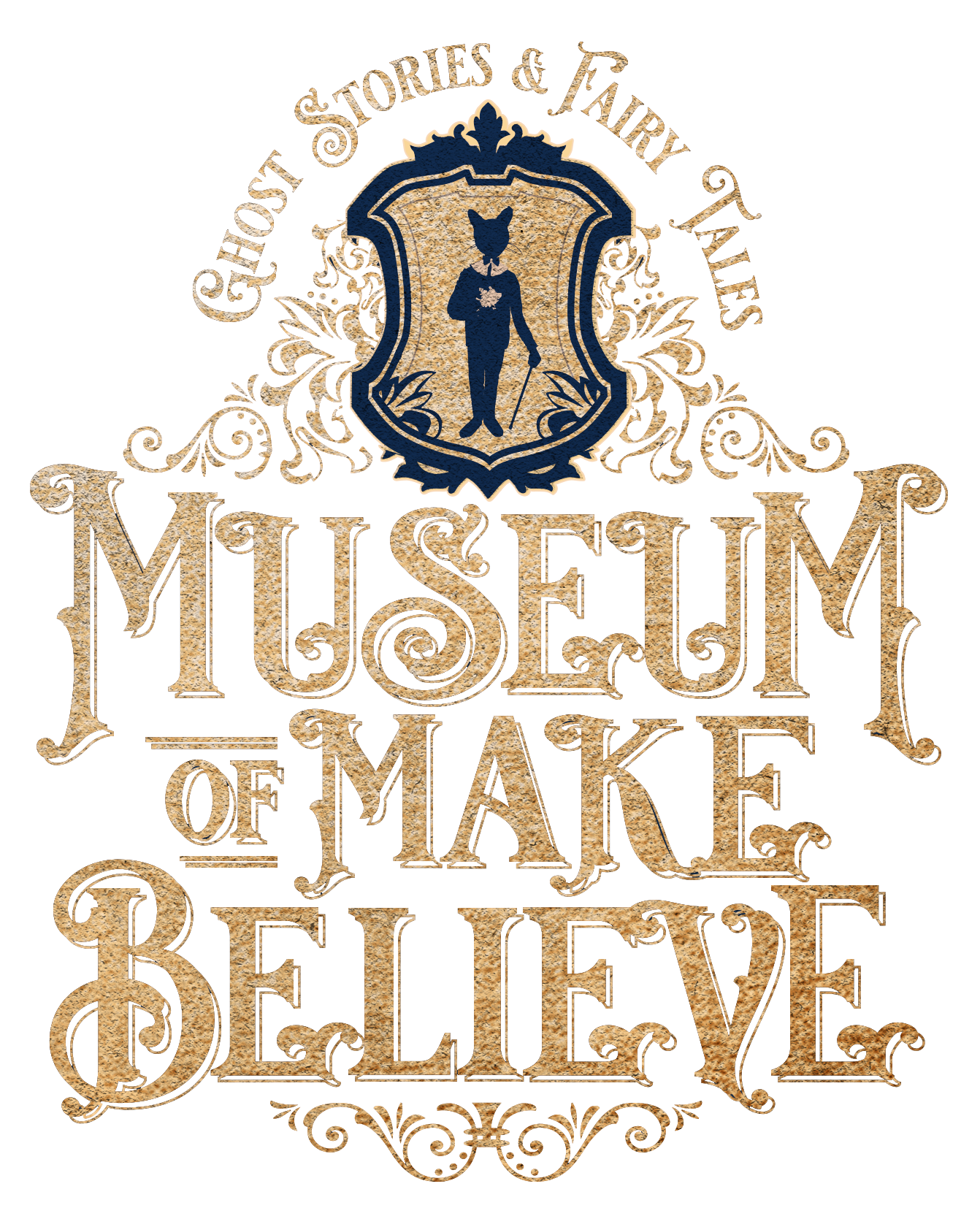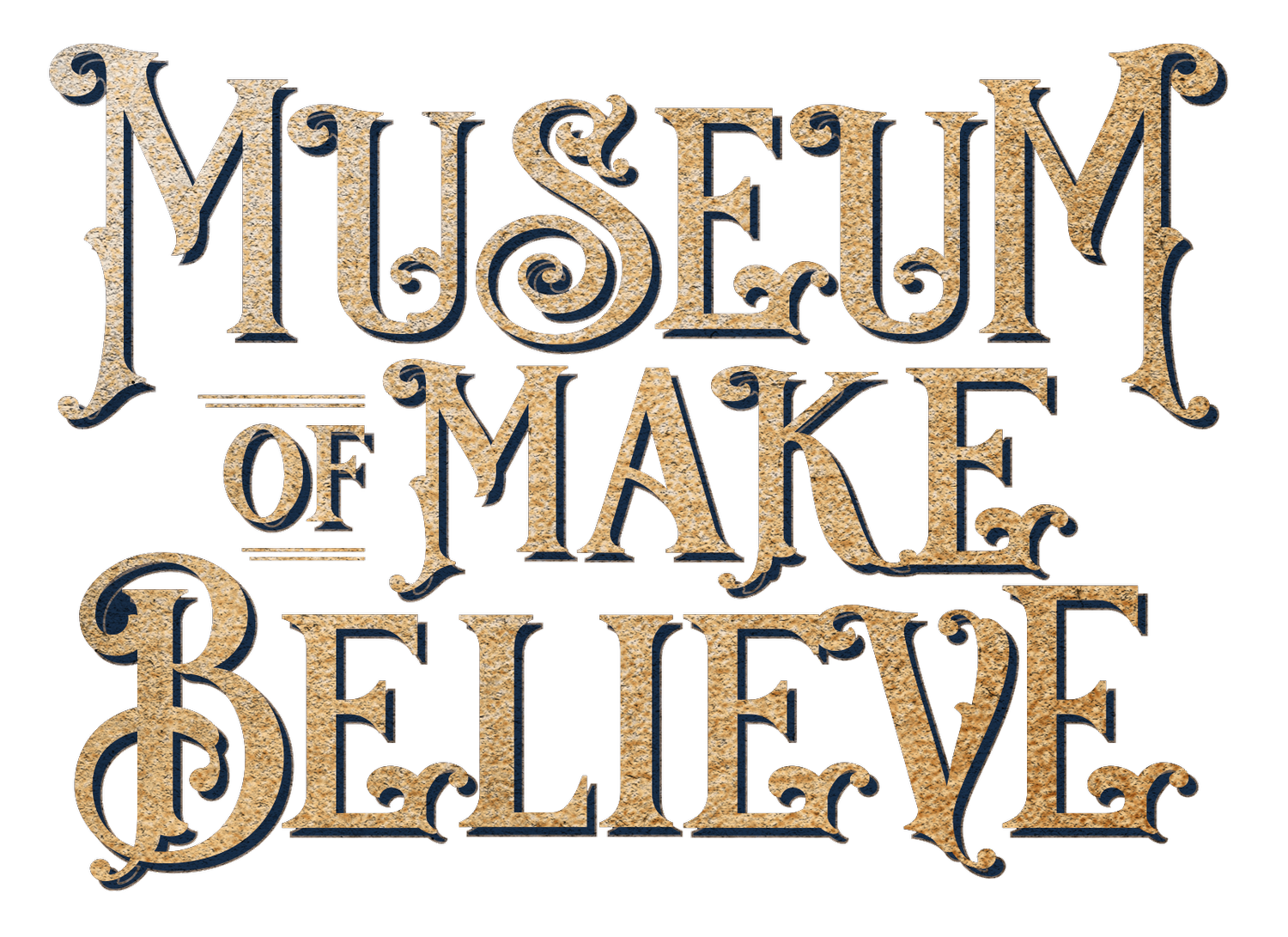Fairy Tales : An Older Kind of Magic
The brothers Grimm, Jacob and Wilhelm, noticed that the art of passing down stories was fading, so they made it their mission to preserve fairy tales in writing and published their first volume in 1812. At Museum of Make Believe we share that same mission. National Tell a Fairy Tale Day is the perfect time for us to share some of our original tales and the art that inspired them. Enjoy!
“Pan-Pan”, 20x20, mixed media painting on panel.
The boat shook violently, cresting with each wave. The crew clung to ropes shouting to one another. Emily watched from her window up above, holding onto the table in front of her for support. She had seen storms like this many times and wasn’t scared. She practically spent her whole life on that boat, she was even born on that very deck. The salt in the air, the green color of the sky before a storm, the sharp curve of the waves was her home.
She looked over her shoulder before wandering down below, stopping to catch herself between each hard jerk. Emily knew every square inch of the boat down to the worn scratches in the wood and the peeling paint. But it wasn’t until a few months ago that she was able to get down below to the brig. It was always locked tight, but when they let the last prisoner free someone forgot to lock the steel gate.
She started playing there, mostly because it was the only place to truly be alone and it allowed her to talk out loud. She knew that the doll made of pink and blue strips of her old dress was lifeless, she was young but not stupid. But she was lonesome and it helped her to imagine a friend.
Emily couldn’t help but be intrigued by the porthole in that cell. It was out of place, a window under the water. It was mostly dark and foggy and impossible to see through it. But the seal was tight and no water leaked around the edges. The bolts holding it in place were caked with orange rust and she spent a few days picking at it with her fingers. She was surprised when she felt one twist. She held her breath and kept turning, waiting for the rush of water. When it finally flung open she felt nothing but a cool breeze against her face.
First she put her hand in tentatively, then her whole arm. She could have sworn she felt something like grass against her fingers, but she couldn’t be sure as she had only been on land a few times before. It took a few days of going back down and breathing the air from that opening, but she finally put her head in and the rest of her quickly followed. She landed on solid earth, surrounded by lush green fields and tiny yellow flowers. She heard the hum of bees, one even landed on her shoe. That first afternoon she just sat in the field breathing the clean fresh air too afraid to get out of sight of the porthole hidden in the branch of an old gnarled tree.
The next day Emily brought a bag of bright red buttons with her and made a trail as she walked out of the field. She saw a small wooden house and heard laughter. The house had a puff of smoke climbing out of the chimney and there were a dozen children chasing a blue ball in the yard. She called out to them, but they ignored her. Finally, she ran up to a girl with blond pigtails and waved her arms. The girl looked through her. She knew they couldn’t see her, but she chased after them just the same.
She followed the buttons back easily and pocketed them for the next day. She knew from the color of the sky that the storm was coming, but decided to go through again anyway. Again she found the children and spent most of the afternoon playing with them in her own way. She followed the buttons back, knowing that she should be in her bed for the heart of the storm when the crew would be most worried about her. She tugged open the porthole and water flooded out, streaming down her feet and into the field below. She put her arm in but could only feel ice cold water. She listened closely and heard screams. Emily slammed the porthole shut and as she turned the bolts vines began to grow over it. She tried to tear them away but they grew too quickly. She ripped as many as she could off but couldn’t keep up. She could only watch feeling small and invisible.
“The Shallow Heart (A Parable of the Sowing)”, 60x60, mixed media painting on panel.
He couldn’t remember anymore. His daughter said he would forget his head if it wasn’t permanently attached to him. At first she said it lovingly, but as years passed she said it with more anger, more frustration. Sometimes he forgot her name, even though he was the one that chose it.
On occasion he could glimpse his wife, her yellow apron wrapped tightly around her waist, her once red hair turning gray as she aged. He could almost smell her sourdough cinnamon rolls, could almost remember how her skin felt like the underside of a newborn’s foot even as it folded and wrinkled.
He tried hard to remember his first communion, his first bicycle, his first kiss. All of those life monuments erased. He sat in his chair, folded his paper the words swimming in front of his eyes, trying to grasp each piece of the puzzle that was his life. His daughter came with photo albums, trying to remind him of each important name, of the lemonade stand he helped her build, of her red-headed boy named after him. But he felt like he was forgetting something even more important than that. Something crucial.
He wandered through the night at night looking for it, in each creaking cabinet, under the bed despite the cracking anger in his back. It was an ordinary day, a Tuesday just after dusk, not that he kept track of days or time anymore, when he found it. Slide in the very back of the closest, past his wife’s dresses that he couldn’t let go of, past the old suit he wouldn’t wear again until his funeral.
It wasn’t much larger than a shoebox. The polish on the wood had mostly rubbed off with age and it left behind a honeyed wood stained with the oil of fingerprints. A thick layer of dust was across the top. He blew on it and then reached for the brass clasps holding it shut. It almost felt like something alive was in it, humming with energy and vibration.
His hands shook as he creaked it open. In an instant, he was struck with a rushing noise and bright lights. Every memory of his life came flooding forward filled with scent and sound. He was there again for his daughter’s birth, for the day he lost a sock at school after gym, for the first time he met his wife and didn’t much care for her. Then in the next instant he could smell her rosewater and he could feel that first quickening of his pulse. He was back in the room being diagnosed by doctors watching his daughter cry. He was at his wife’s funeral. He got to ride that first bicycle again; the wind in his face stinging his eyes.
His daughter found him that way, clutching an empty wooden box. They thought maybe he had a heart attack or some other illness that stopped his brain in its tracks. But she saw the small secret smile on his face, frozen.
“Calico Queen”, 20 x20, mixed media painting on panel.
Rose left home when she was quite young. It wasn’t that she was unhappy there, but she knew she was a burden on her parents. They didn’t protest when she told them one day that she was going to the city to find work. She started by serving drinks. It was a rough crowd and most nights she walked out to the sky full of bright stars and the streets full of noise. Her arms were sticky with liquor that spilled and splashed on them. On occasion she would lick her arm to taste the bitter bourbon. She didn’t really like it, but was always curious. It was just her nature.
She hadn’t expected to run away with someone, but the night he came in she just knew. She didn’t know him really, but he had a beautiful head of black curly hair and eyes that were the exact color of coffee. It warmed her just looking at him, especially for those few seconds when their hands touched as she passed him his drink. He looked uncomfortable and she thought it was because of her dress which she kept trying to tug over her knees.
He came every night for weeks until she finally agreed to marry him. They had a small quiet ceremony at home with only the minister and his black mongrel of a dog who chewed a bone in the corner, occasionally lifting his head to growl at the air. He looked warily at Rose, but carried his bone to her new husband’s feet offering it in supplication. They laughed about it that night.
She knew that her husband grew restless at night and had a difficult time sleeping. As soon as the sun started to set, his temper would grow short and he would argue with her about small things, often leaving her in tears. She started serving dinner early. He would bring her a cup of tea just as the sun was darkening. It was a kind gesture and it brought her such peace that she often went to bed right after. She slept soundly, only waking up as the light began to grow.
The next morning, she would find her husband at the kitchen table looking tired and weak. They fell into this pattern for years, never being in the same room when it was dark. During the day they often had picnics and told jokes and Rose told herself that this was enough.
She overlooked the odd things. Piles of brown straight hair that didn’t match either of theirs that she swept up daily with a fury. She once found the thick leg of a chicken bone tucked under one of the armchairs, but she threw it out with a grimace and didn’t look back. She even managed to overlook the blood stains that often sprouted on her husband’s clothes. She just scrubbed them away until her fingers burned.
One night, when he wasn’t looking she poured her tea into a plant. She went to bed as usual, but didn’t sleep. The first howl made her skin crawl and she couldn’t place it. The second sounded as if it was in the house. She waited quietly and held her breath when the door creaked open.
She only saw a shadow, followed by a sharp clicking sound against the floorboards. The weight of the bed shifted as this creature climbed and then settled in on top of the quilt. Early the next morning as the light began to filter in the room, she saw her husband naked and curled in a ball at the foot of her bed. He clutched half of a rabbit carcass in his hand. He quietly slid out of the room and started to close the door behind him, at the last moment catching Rose’s startled gaze in his own.

